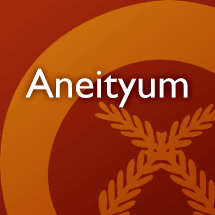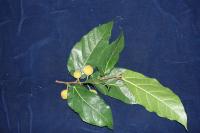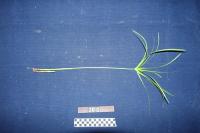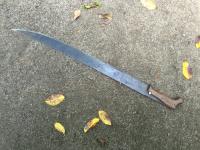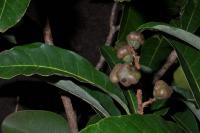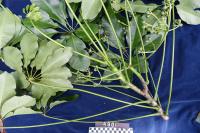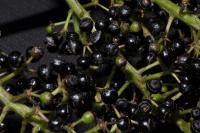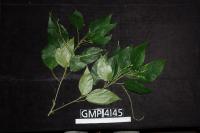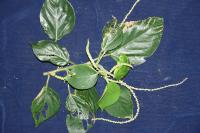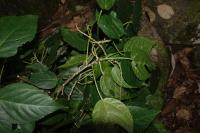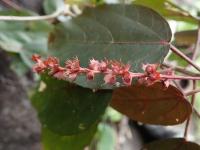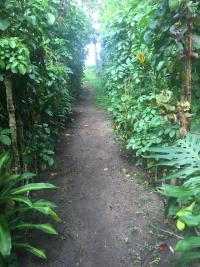This page has returned 100 entries
nauwatamu
n. kind of sugarcane
bookmarknauwau
n. a bulrush; a flag
bookmarknauyan
n. dawn of day
bookmarknauyerop
n. species of sycamore (117); a sycamore fig (97)
bookmarknauyerop̃
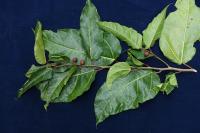
n. tree, 2 m tall (collection: Gregory M. Plunkett #3487)
Example: 1. To cure spirit sickness of the niteitau. Use plants that also end with "au" : niditau, intoutau, naoyerop. Go to the top of the plant to get the soft leaves of the plants niditau, intoutau, naoyerop, also take the bark. The person making the medicine should be holding the these leaves with a piece of nelmaha. Nelmaha means go away. The sick person chews the leaves and bark and swallows the juice spitting out the fiber into the nelmaha the medicine maker is holding. The medicine person then takes the spit out fiber in the nalmaha leaf and throws it into the sea in front of the village. 2. Edible fruits, when ripe or green, does not taste when green, but sweet when ripe. 3a. Leaves (young) are edible, for example wrap around coconut meat and eat or cook with island cabbage and other leaves, boil and add coconut milk and eat. 3b. The young leaves are edible, after boiling for 5 minutes. A piece of coconut and a pinch of salt is wrapped in the leaves and eaten. The mature leaves are used to wrap food such as pig or cow meat and cooked in an earth oven. Tie this bundle with a piece of Pandanus fiber to secure it before putting in the earth oven. 4. During big feast, use this a lot – circumcison or wedding feast, harvest leaves and wrap around meat and bake on earth oven – sometimes we cut down a whole tree to gather leaves. 5. To make men’s custom belt – split stem, peel outer bark off to take inner bark and peel it, tear end to make strap that can be tied. Dry in sun but not direct sunlight. 6. Older large trunks were burned by ancestors to keep fire going – did not need matches (lefre(?) matches) because embers would stay for days and when make a fire add smaller branches to make a flame.
bookmarknauyerop
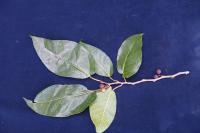
n. tree, 3 m tall (collection: Gregory M. Plunkett #3505)
Example: The young leaves are edible, after boiling for 5 minutes. A piece of coconut and a pinch of salt is wrapped in the leaves and eaten. The mature leaves are used to wrap food such as pig or cow meat and cooked in an earth oven. Tie this bundle with a piece of Pandanus fiber to secure it before putting in the earth oven. Both the green and ripe fruits are edible.
bookmarknauyerop̃
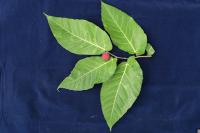
n. sparsely branched small tree, 3 m tall (collection: Gregory M. Plunkett #3209)
Example: The fruit is edible when ripe and when it is younger can be eaten with salt. The young leaves are eaten raw, after being rubbed with coconut meat and salt. Cover pork to be cooked in the oven with the leaves of this plant, tie them on with a rope made from Pandanus leaf and put taro on the fire as well. The oily part of the pig will mix with the taro and enhance its flavor.
bookmarknauyerop
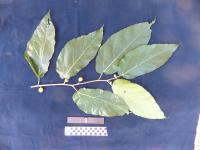
n. tree. Village home garden. (collection: Ashley A McGuigan #9)
Example: 1. To cure spirit sickness of the niteitau. Use plants that also end with "au" : niditau, intoutau, naoyerop. Go to the top of the plant to get the soft leaves of the plants niditau, intoutau, naoyerop, also take the bark. The person making the medicine should be holding the these leaves with a piece of nelmaha. Nelmaha means go away. The sick person chews the leaves and bark and swallows the juice spitting out the fiber into the nelmaha the medicine maker is holding. The medicine person then takes the spit out fiber in the nalmaha leaf and throws it into the sea in front of the village. 2. Edible fruits, when ripe or green, does not taste when green, but sweet when ripe. 3a. Leaves (young) are edible, for example wrap around coconut meat and eat or cook with island cabbage and other leaves, boil and add coconut milk and eat. 3b. The young leaves are edible, after boiling for 5 minutes. A piece of coconut and a pinch of salt is wrapped in the leaves and eaten. The mature leaves are used to wrap food such as pig or cow meat and cooked in an earth oven. Tie this bundle with a piece of Pandanus fiber to secure it before putting in the earth oven. 4. During big feast, use this a lot – circumcison or wedding feast, harvest leaves and wrap around meat and bake on earth oven – sometimes we cut down a whole tree to gather leaves. 5. To make men’s custom belt – split stem, peel outer bark off to take inner bark and peel it, tear end to make strap that can be tied. Dry in sun but not direct sunlight. 6. Older large trunks were burned by ancestors to keep fire going – this was during the time when people did not have matches and did not need them as the embers of this tree would stay hot for days and when it was time to make a stronger fire, people would add smaller branches to make a flame appear.
bookmarknauyerop̃ u inman
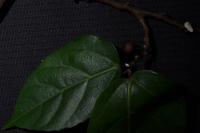
nawa
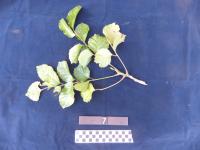
n. shrub. Village pathways. ornamental. (collection: Ashley A McGuigan #7)
Example: 1. Heat the leaves then place on the sore muscle. 2. Edible plant, cook young leaves until soft and then can eat, as a vegetable or soup, with any food. 3. Same use as AAM 3 to heat and put on body to heal pain. 4. On a reef when it is time to protect the reef to conserve it and bring more fish, you take this plant and put it in the hole in the reef – cut stem and put it in reef in several parts. People will know it is under protection and respect it.
bookmarknawod
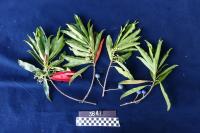
n. tree, 12 m tall (collection: Gregory M. Plunkett #3641)
Example: 1. The wood of this tree is used to make temporary houses, for example, when making a garden by the river. 2. The wood can be sawn into timber. 3. People collect red leaf and put under tongue when want to talk about conflicted issues such as a dispute to make their argument stronger.
bookmarknawou
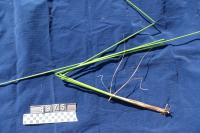
nawou
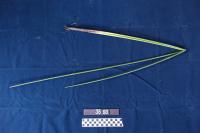
naytmas
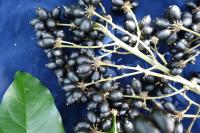
n. tree to 5 m, dbh 4 cm (collection: Michael J. Balick #4898)
Example: The leaves are used to cover goat or pig meat when a person is roasting it on an earth oven It prevents it from burning and enhances the taste of the meat.
bookmarkneaig
n. the kernel of a coconut; the coconut tree
bookmarkneaig aged
n. a spotted coconut
bookmarkneaig ahi
n. a white coconut
bookmarkneaig auyag
n. kind of palm
bookmarkneaig cap
n. a red coconut
bookmarkneaig milmat
n. a green coconut
bookmarkneandel
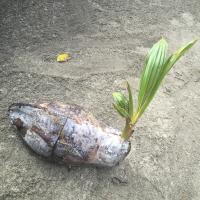
neau
n. a small water-plant
bookmarknebgev legenhap

n. Scalloped hammerhead
Example: Photo by Xvic / Wikimedia Commons, License: CC BY-NC-SA 3.0 via Fishes of Australia
bookmarknecemas
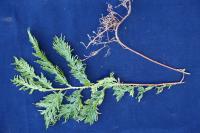
n. terrestrial plant, growing in dry forest. (collection: Gregory M. Plunkett #3509)
Example: This is a "message plant" that signifies that there has been a death. The person holds it or puts it on their head, goes to another person’s house and hands it to the person they wish to convey the message to, without saying anything and that person knows that someone has died. It can also be handed to that person. The person receiving the message then asks "who" and is told the deceased person’s name.
bookmarknecemas
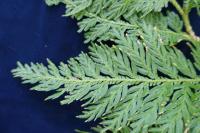
n. fern to 30 cm, cones green (collection: Michael J. Balick #4919)
Example: Use this plant to send a message to someone that another person has died. Take 1 dried leaf, to pass message to another village/tribe or people. Hold it in your hand and walk past a person, then they know that someone has died.
bookmarknecemas moso
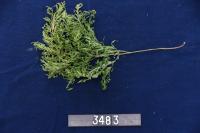
n. terrestrial plant on forest floor, growing in disturbed forest. (collection: Gregory M. Plunkett #3483)
Example: 1. This is a "message plant" that signifies that there has been a death. The person holds it or puts it on their head, goes to another person’s house and hands it to the person they wish to convey the message to, without saying anything and that person knows that someone has died. It can also be handed to that person. The person receiving the message then asks "who" and is told the deceased person’s name. 2. Use it to produce more fog on top of mountain – use w/ another plant, nap̃at (GMP 3268) – put these in a hole on the sacred stone to ferment as it fills with water. After it rots there will be a lot of fog. Name of stone = NAEMOSO. So the fog helps keep the plants moist and growing well.
bookmarknecjop̃dak
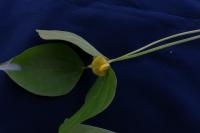
n. low-growing, creeping vine growing in grassy area just inland from coastal strand. Flowers yellow. (collection: Gregory M. Plunkett #3223)
Example: The leaves of this plant are used to treat stomach ache. Take a handful of leaves and mix with 1/2 liter of water, crush the leaves in the water and drink the entire amount when your stomach hurts. Alternatively, this can also be consumed 1x a week as a tonic drink for the stomach and system.
bookmarknecjop̃dak
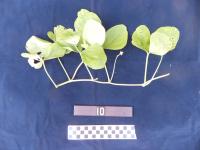
n. prostrate creeping vine along coastlines. (collection: Ashley A McGuigan #10)
Example: 1. To cure rubbush blood - Take a handfull f leaves of any age, pound it into a cupfull of water, squeeze the juice and drink when woman feels pain in head or inside the body or when the inside of the body is hot. Drink this once a day until the pain goes away. 2. To cure excessive bleeding after giving birth - boil naojapdak leaves (2-16) in seawater until leaves are soft and the water is brown. Sit on this water. 3. To close the cervix - boil 2 naojapdak leaves in water and bath in it. 4. Medicine: Smash leaves 1 handful, into cup and add a small amount of water to treat constipation—1 cup for children; 1.5 litres for adults. 5. Stomachache: same treatment, will clear bowel. 6. For leg sores, collect whole plant, put in water – a pool of water for 1 week, then use to dip sore as on leg into it for 10-15 minutes cure the sore.
bookmarknecjopdak
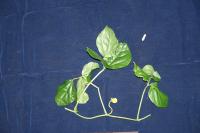
n. scrambling vine, growing in coastal strand vegetation. Flowers yellow. 1. Medicine: Smash leaves 1 handful, into cup and add a small amount of water to treat constipation—1 cup for children; 1.5 XX for adults. 2. Stomachache: same treatment, will clear bowel. 3. For leg sores, collect whole plant, put in water – a pool of water for 1 week, then use to dip sore as on leg into it for 10-15 minutes cure the sore. (collection: Gregory M. Plunkett #3437)
bookmarknecna
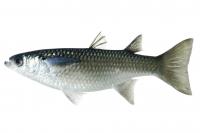
n. Fringelip mullet
Example: Photo by Jeffrey T. Williams / Smithsonian Institution, License: CC BY-SA 3.0 via Fishes of Australia
bookmarknecna p̃a
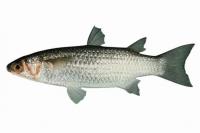
n. Largescale mullet
Example: Photo by ANFC, License: CC BY-NC 3.0 via Fishes of Australia
bookmarknecñanjaa
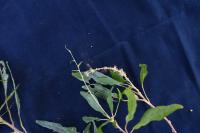
n. shrub to 2 m, dbh 3 cm (collection: Michael J. Balick #4862)
Example: The common name of this plant refers to the footprint of a chicken. Mix the dried leaves of this plant with pieces of coconut and feed to chickens. They are said to really like it. Plant the shrub near the place that chickens are kept. This feed will make the chickens produce more eggs and also increase the number of healthy chickens.
bookmarknecñanman
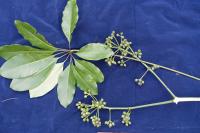
necñanman
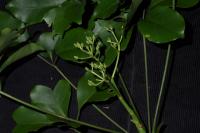
necñanpaeñ
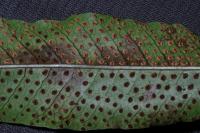
necñap̃it cei
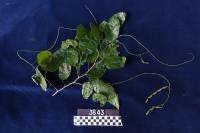
necñopod
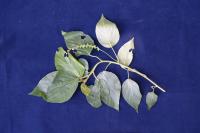
n. shrub, 1 m tall (collection: Gregory M. Plunkett #3512)
Example: This plant is used as fertilzer to place on bottom of the taro patch in the same way as GMP #3456 to help "feed the ground" for next year. The leaves are used to wrap food. When a person is chewing kava, pile the chewed kava roots on the young leaves of this species. Also, an unspecified medicinal use.
bookmarknecñopod
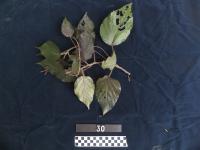
necñopod cap
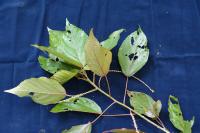
n. shrub to 2. 5 m tall, 1 cm dbh (collection: Michael J. Balick #4856)
Example: When a person gets burned by a fire, take the leaves, squeeze sap on the burn, and then rub a handful of leaves on the burn; use a larger amount of leaves if the person has a larger burn. Apply it directly after the person is burned. This treatment will stop the burn from blistering. Use once. When a 1 month to 2 year old baby has redness or sores on their tongue and cannot eat properly, and saliva is coming out from their mouth, take the sap of the crushed leaves in a spoon and give it to the baby. Take one teaspoon for a 1-5 month old child and a tablespoon for a 6-24 month old. Give the baby once a day for 2 days. This treatment cleanses out the reddish sores. If a person has a sore that is persistent and stays red and sore for a week or more, take 4 apices of this plant, chew and spit on the sore to help it heal. Use 1x in the morning, and next day in the afternoon. Use 2x only. If a person is walking in the bush and concerned about evil spirits, put a small branch behind the ear to be safe. To treat hot chest pain, dizziness, shortage of breath, and if a person has a hot pain that does not go away after taking panadol (aspirin), take 8 leaves and squeeze into a glass of water until it turns reddish, drink 1x a day for 3 days; this is said to make the pain go away.
bookmarknecrakiti
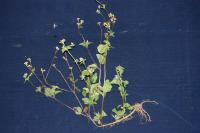
n. herb, growing at edge of garden area. (collection: Gregory M. Plunkett #3601)
Example: This is a "calendar plant". In winter months, if a person sees this plant in flower it is confirmation that the sea turtle has plenty of grease or fat and is good to eat. As a medicine for a cut, collect some leaves, mash them and squeeze the juice on a cut or sore on the body. Do this treatment 3x daily until the sore dries up or the cut heals.
bookmarknecsap
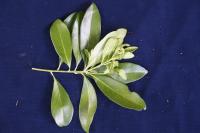
n. shrub, 2 m tall (collection: Gregory M. Plunkett #3534)
Example: This tree has very hard wood. 1. Use the small stems to plant dry land or swamp taro, sharpening the end and pushing it into the ground to make a hole. 2. It also is useful for fence, posts for houses. 3. Small stems are also used to make a comb for the hair. 4. Plant pole for taro kava. 5. A branch is shaped and used to husk coconut. 6. The wood is hard and in ancient times people would take a forked piece and put string on one side of it, sharpen the other side and use with the string as a fish hook – need to keep rope tight until it is in the canoe. Do not give it slack – strong use AAM 17.
bookmarknecsap
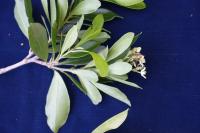
n. shrub to 2 m, flowers white. Red clay soil (collection: Michael J. Balick #4887)
Example: The stem makes a good digging stick to plant taro. Also branches of this tree are cut to tie the canoe to the outrigger. Used for the small sticks that sit at the base of the larger sticks that hold the outrigger (see photos).
bookmarknecsap̃
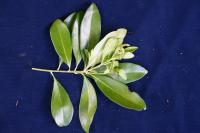
n. shrub, 2 m tall (collection: Gregory M. Plunkett #3534)
Example: This tree has very hard wood. 1. Use the small stems to plant dry land or swamp taro, sharpening the end and pushing it into the ground to make a hole. 2. It also is useful for fence, posts for houses. 3. Small stems are also used to make a comb for the hair. 4. Plant pole for taro kava. 5. A branch is shaped and used to husk coconut. 6. The wood is hard and in ancient times people would take a forked piece and put string on one side of it, sharpen the other side and use with the string as a fish hook – need to keep rope tight until it is in the canoe. Do not give it slack – strong use AAM 17.
bookmarknecyak
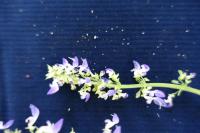
n. herb to 20 cm, flowers blue. (collection: Michael J. Balick #4922)
Example: Roast the tuber of this vine on an open fire for 20-40 minutes, peel off the skin and eat like cassava or taro. Chew it and drink the "juice" while spitting out the fiber. It grows wild, season of harvesting is in May. Very tasty food for people, considered "numba wan" food for this island.
bookmarknedaugatmas
n. kind of tree
bookmarknedec
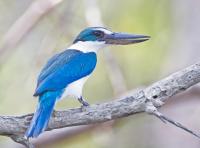
[neθeɣ] n. Collared Kingfisher
Example: Photo by JJ Harrison, License: CC BY-SA 3.0 via Wikimedia Commons
bookmarknedeij
n. a small gray berry used as beads
bookmarknedelat
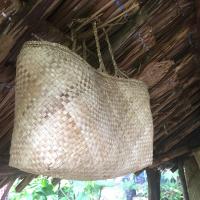
nedenc
n. stinging; the fruit of the kaleteug
bookmarknedjap
n. kind of tree
bookmarknednaeñ
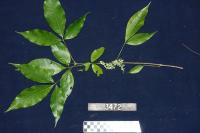
nednaiñ lelcei
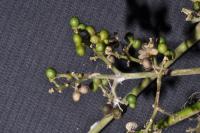
nednañlelcei
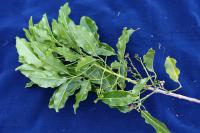
nedouyatmas
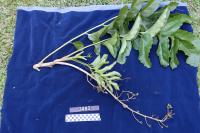
nedouyatmas
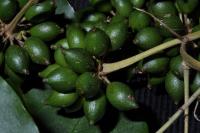
neducai inhujid
n. kind of tree
bookmarkneduodo
n. kind of tree
bookmarkneduon
n. a bone, a foot
bookmarkneduon
n. low mountain
bookmarkneduon yau
n. kind of banana
bookmarkneduwudu
adj. full of seeds, as the pawpaw apple
bookmarknedwodou
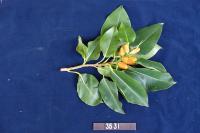
n. tree, 10 m tall (collection: Gregory M. Plunkett #3531)
Example: 1. For a child around 1 year of age, take the inside bark, mash it, boil in hot warter and then use it to wash the child. This will ensure that the child will grow strong and make them able to crawl fast. 2. If a woman who is one month pregnant would like to have a baby, she is given 4 of the tips of the branches to chew and swallow everything before breakfast 1x only. 3. For fishing, take 4 leaves, hold top side up, tear right half of leaves off, keep left side, roll it up and put with fishing gear to have good luck when fishing in the deep sea beyond the reef.
bookmarknedwodou
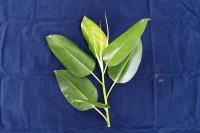
n. tree to 6 m, dbh 10 cm (collection: Michael J. Balick #4865)
Example: To bring luck when fishing. Take 4 leaves with stems still on them-- first thing in the morning, when it is cool and quiet and there is not much noise, break the left hand side from two leaves and the right hand side from two leaves (total 4 half leaves) and take those pieces and put in the bag containing your fishing gear. The meaning of the local name is that "these leaves will please the Sea God" who will not understand it if a fisherman does not have leaves with them on their trip. There are groups of people who are part of the Sea Gods and you must notify these people before you go out to fish. If you have these leaves in your bag, you are said to get many fish. In the past certain people were responsible for the harvest from the sea; these people used to know this ritual. Not much known at present. Birds eat the fruit of this tree as does the flying fox.
bookmarknedwonomo
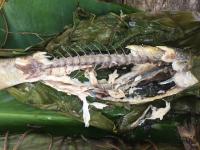
nefelelicai
n. grass; weeds; thistle
bookmarknefelelicai acen
n. hemlock
bookmark